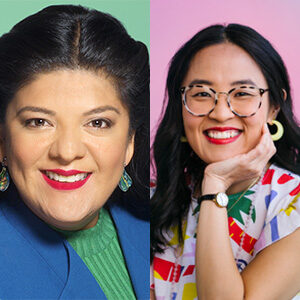Pictured: Marcia Aguilar Kailian & Ahran Lee
To celebrate their new Improv for BIPOC workshop and class, Berkeley Improv did an interview with teachers Marcia and Ahran.
How did you get into improv?
Marcia: In high school and college I was exposed to improv through theater, and I found my flow. Improv was a place where I could be myself and be a character. In my experience in theater – which I love – it could be hard because a lot of times I didn’t fit the role – in my mind, this was because of what I presented as, and how I looked. In improv, I get to cast myself in anything I want. It gives me that freedom.
Ahran: I love how our improv origin stories are so diverse! I’m one of those players who discovered improv later in life. I have zero stage performance background. Improv came into my life when I was suffering from crippling depression. My ex-husband introduced me to improv to support my mental health. Improv is a gentle outlet to access parts of you that you otherwise wouldn’t have, and it’s all done through play. In improv I don’t have to shapeshift in any way, I can bring all of myself to it, and it’s accepted, and not only that, people really like when I made a mistake. Something about that process transformed me. For such a long time I thought I had to be a certain shape, be a certain way to legitimize myself as an artist, and for the first time, just being my messy self was the material.
Marcia: Yeah, to piggyback on that, in improv, you can get out of your head and into your body where you are reacting and responding genuinely. In regular life, it’s so normal to be in our heads and overthink things and stress and worry, so when we can let that go, it’s healing.
The two of you are going to be leading Improv for BIPOC at Berkeley Improv. Can you tell us how you came up with the idea to teach this class and why it’s so important?
Maria: Ahran and I met in a BIPOC class taught by Betsaida Lebron out of Sacramento, and we had great chemistry. The idea of a BIPOC class at Berkeley Improv came from a student in one of my other classes. Right after she asked me, literally at that moment, Ahran is walking through the door, and I said, “Ahran, do you want to teach a BIPOC improv class with me –
Ahran: YES!
Marcia: Yeah! It was an enthusiastic ‘yes!” And so here we are.
Ahran: There is absolute urgency for a dedicated BIPOC space for any creative person of color. What we reckon with is the issue of who we do our art for, and who is the inner critic. This usually tends to be that of a white male; we are constantly making art around that gaze. It impacts our expression. People of color tend to protect ourselves by shutting down a big part of who we are. You can’t make art that way, you can’t fully express yourself authentically if you compartmentalize. So having a space that is just for Black, Indigenous, people of color, to me, is linked to survival and thriving. If you are in a space where there isn’t that white gaze, our bodies can have a full exhale, and we can completely be relaxed and show up exactly as we are. It’s not just about playing, it’s about having a full-body exhale with other people who have that shared reality. So it’s imperative that we have this space.
What you are saying is so important. Can you say more about being a person of color in the world of improv?
Ahran: I can say this – it’s doubly important that there are two women of color at the helm of this. As we all know, improv is a very masculine space so to have women in leadership signifies a lot.
What has your experience been like at Berkeley Improv?
Ahran: Something I felt with Arastoo’s 301 class – the teacher and students that have known each other for a long time. It’s a steady group of people who show up, and it feels like an intimate space. It feels very homey, like a homey community that I haven’t experienced in other theaters.
Marcia: I love the class I’ve gotten to teach at Berkeley Improv: Improv for Real Life. It coincides with my mission of bringing joy and improv to everybody. It’s been like, “yes, this is what it improv is supposed to be like.” Folks coming to play.
What other projects are getting you excited?
Marcia: I’m teaching Improv for Real Life at Berkeley Improv in January. And I’m working on a solo performance, a one-woman show. Folks can sign up for my email newsletter at my website Cocreatetheater.com.
Ahran: I teach a BIPOC drop-in improv class every 3rd Sunday through Improv college, an online improv theater based in Montreal. And you can find me at Ahranlee.com.

